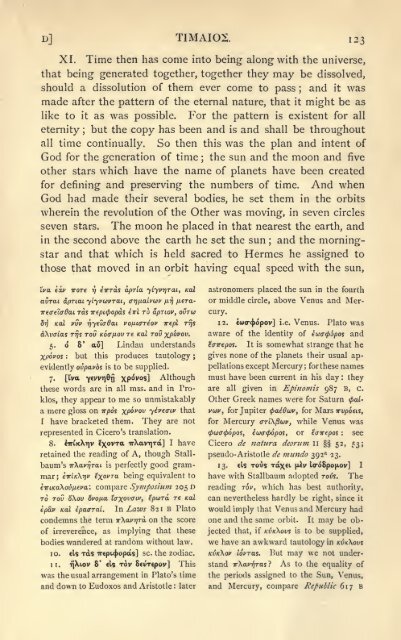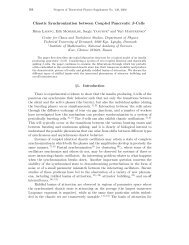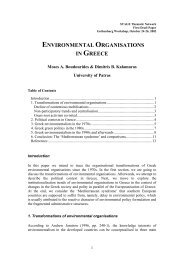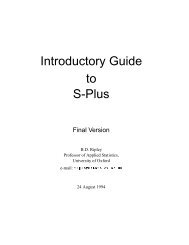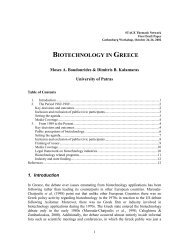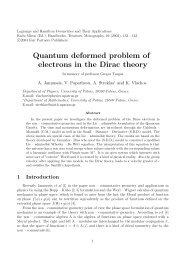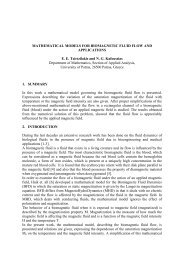You also want an ePaper? Increase the reach of your titles
YUMPU automatically turns print PDFs into web optimized ePapers that Google loves.
XI.<br />
TIMAI02. 123<br />
Time then has come into being along with the universe,<br />
that being generated together, together they may be dissolved,<br />
should a dissolution <strong>of</strong> them ever come to pass and it was<br />
;<br />
made after the pattern <strong>of</strong> the eternal nature, that it<br />
might be as<br />
like to it as was possible. For the pattern<br />
is existent for all<br />
eternity but the ; copy has been and is and shall be throughout<br />
all time continually. So then this was the plan and intent <strong>of</strong><br />
God for the generation <strong>of</strong> time the sun and the moon and five<br />
;<br />
other stars which have the name <strong>of</strong> planets have been created<br />
for defining and preserving the numbers <strong>of</strong> time. And when<br />
God had made their several bodies, he set them in the orbits<br />
wherein the revolution <strong>of</strong> the Other was moving, in seven circles<br />
seven stars. <strong>The</strong> moon he placed in that nearest the earth, and<br />
in the second above the earth he set the sun ;<br />
and the morningstar<br />
and that which is held sacred to Hermes he assigned to<br />
those that moved in an orbit having equal speed with the sun,<br />
'iva. ta,v Trore >} cirra* apria ylyvijTai, Kal<br />
avTai apTiai yiyvuvTai, a"r)/J.aii'ui> yui) jueraireffLffda.L<br />
TO.S TrepHpopas lirl TO apriov, OVTW<br />
877 Kal vvv -qyeiffOai v<strong>of</strong>J.iffT^ov irepl TT)J<br />
aXucnas T^S rou /cocrjuou re Kal TOV xpovov.<br />
5. 6 8' afl] Lindau understands<br />
Xp<strong>of</strong>os : but this produces tautology ;<br />
evidently ovpavos is to be supplied.<br />
7. [Hva -yevvrjOTJ XP VOS ] Although<br />
these words are in all mss. and in Proklos,<br />
they appear to me so unmistakably<br />
a mere gloss on wpoj XP OVOV y^vecnv that<br />
I have bracketed them. <strong>The</strong>y are not<br />
represented in Cicero's translation.<br />
8. irK\Tiv ?x VTa ir\avt]Ta] I have<br />
retained the reading <strong>of</strong> A, though Stallbaum's<br />
irXavrjrai is perfectly good grammar;<br />
emK\r)v ^x ot>Ta being equivalent to<br />
eTTiKaXov/jLtva: compare Symposium 205 D<br />
TO TOV ti\ov 6v<strong>of</strong>J.a tffx ovffl-v > fywrd rt Kal<br />
epav Kal ipaaTai. In Laws 82 [ B <strong>Plato</strong><br />
condemns the term TrXa^T/rd, on the score<br />
<strong>of</strong> irreverence, as implying that these<br />
bodies wandered at random without law.<br />
10. els TO.S Trepi4>opas| sc. the zodiac.<br />
1 1. rjXiov 8' ls TOV Stvrtpov] This<br />
was the usual arrangement in <strong>Plato</strong>'s time<br />
and down to Eudoxos and Aristotle: later<br />
astronomers placed the sun in the fourth<br />
or middle circle, above Venus and Mercury.<br />
12. i>os. It is somewhat strange that he<br />
gives none <strong>of</strong> the planets their usual appellations<br />
except Mercury; for these names<br />
must have been current in his day : they<br />
are all given in Epinomis 987 B, c.<br />
Other Greek names were for Saturn ut>,<br />
for Jupiter QatOuv, for Mars irvpoeis,<br />
for Mercury ffriXfiuv, while Venus was<br />
w(Topos, eo>(Tos, or &T7re/>os : see<br />
Cicero di? natura deorum n 52, 53;<br />
pseudo-Aristotle de mundo 392* 23.<br />
13. els TOVS ra\u jUv l


